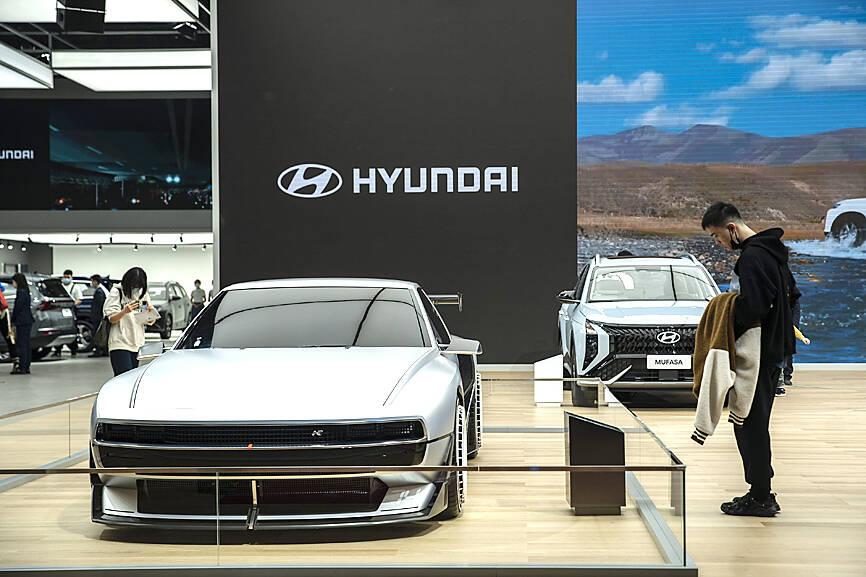Hyundai Motor Group and SK On Co plan to spend as much as US$5 billion in North America to produce electric vehicle (EV) batteries, as US President Joe Biden’s green bill encourages companies along the EV supply chain to invest in the US.
The South Korean firms would have an equal shareholding in the plant, to be constructed in Bartow County, Georgia. The facility is expected to start producing EV battery cells in the second half of 2025.
The new plant would have an annual production capacity of 35 gigawatt-hours of EV battery cells, enough to produce 300,000 all-electric vehicles.

Photo: Bloomberg
The joint venture “further accelerates the group’s electrification efforts and bolsters its position as an EV leader in the US market with a stable battery supply,” Hyundai said in a statement yesterday.
The automaker in November last year signed a memorandum of understanding with SK On to secure battery supply for North America.
Affiliate Hyundai Mobis Co is to assemble battery packs using cells from the planned plant, then supply them to Hyundai Group’s US manufacturing facilities for the production of models including the Ioniq 5, the Kia EV6 and the Genesis GV60.
Biden’s Inflation Reduction Act enacts large-scale subsidies for low-carbon industries, particularly through production tax credits. It has encouraged a slew of global automakers and EV battery makers to step up investment plans in the US, where certain electric vehicles would be eligible for up to US$7,500 in credits if they meet requirements that battery components or critical minerals are sourced from North America or US free-trade partners.
Hyundai was among automakers excluded from that US$7,500 credit, as it did not meet a vital requirement of having an operational EV plant in the US. Hyundai is planning to start operating its EV plant in Georgia as early as the end of next year.
The firm’s first-quarter profit beat analysts’ estimates, with operating profit increasing 86 percent year-on-year to 3.6 trillion won (US$2.7 billion). Revenue rose 25 percent to 37.8 trillion won, while gross margin was 20.4 percent, Hyundai said yesterday.
“The strong sales mainly stemmed from the improvement of production, as chip and component supplies stabilized worldwide,” Hyundai said.
It added that it sees “persistent external factors, such as expanding inflation and fluctuation of raw material costs and interest rates due to geopolitical issues.”
The company is expanding its market share, particularly in Southeast Asia, with its lineup of electric vehicles and sports utility vehicles, Goldman Sachs Group Inc analyst Kota Yuzawa said.
While Southeast Asia’s auto market “has been dominated by Japanese carmakers historically, a lack of competitive Japanese EV models until 2025 will pose opportunities for Hyundai,” Yuzawa said in a note on April 14.

Intel Corp chief executive officer Lip-Bu Tan (陳立武) is expected to meet with Taiwanese suppliers next month in conjunction with the opening of the Computex Taipei trade show, supply chain sources said on Monday. The visit, the first for Tan to Taiwan since assuming his new post last month, would be aimed at enhancing Intel’s ties with suppliers in Taiwan as he attempts to help turn around the struggling US chipmaker, the sources said. Tan is to hold a banquet to celebrate Intel’s 40-year presence in Taiwan before Computex opens on May 20 and invite dozens of Taiwanese suppliers to exchange views

Application-specific integrated circuit designer Faraday Technology Corp (智原) yesterday said that although revenue this quarter would decline 30 percent from last quarter, it retained its full-year forecast of revenue growth of 100 percent. The company attributed the quarterly drop to a slowdown in customers’ production of chips using Faraday’s advanced packaging technology. The company is still confident about its revenue growth this year, given its strong “design-win” — or the projects it won to help customers design their chips, Faraday president Steve Wang (王國雍) told an online earnings conference. “The design-win this year is better than we expected. We believe we will win

Chizuko Kimura has become the first female sushi chef in the world to win a Michelin star, fulfilling a promise she made to her dying husband to continue his legacy. The 54-year-old Japanese chef regained the Michelin star her late husband, Shunei Kimura, won three years ago for their Sushi Shunei restaurant in Paris. For Shunei Kimura, the star was a dream come true. However, the joy was short-lived. He died from cancer just three months later in June 2022. He was 65. The following year, the restaurant in the heart of Montmartre lost its star rating. Chizuko Kimura insisted that the new star is still down

While China’s leaders use their economic and political might to fight US President Donald Trump’s trade war “to the end,” its army of social media soldiers are embarking on a more humorous campaign online. Trump’s tariff blitz has seen Washington and Beijing impose eye-watering duties on imports from the other, fanning a standoff between the economic superpowers that has sparked global recession fears and sent markets into a tailspin. Trump says his policy is a response to years of being “ripped off” by other countries and aims to bring manufacturing to the US, forcing companies to employ US workers. However, China’s online warriors